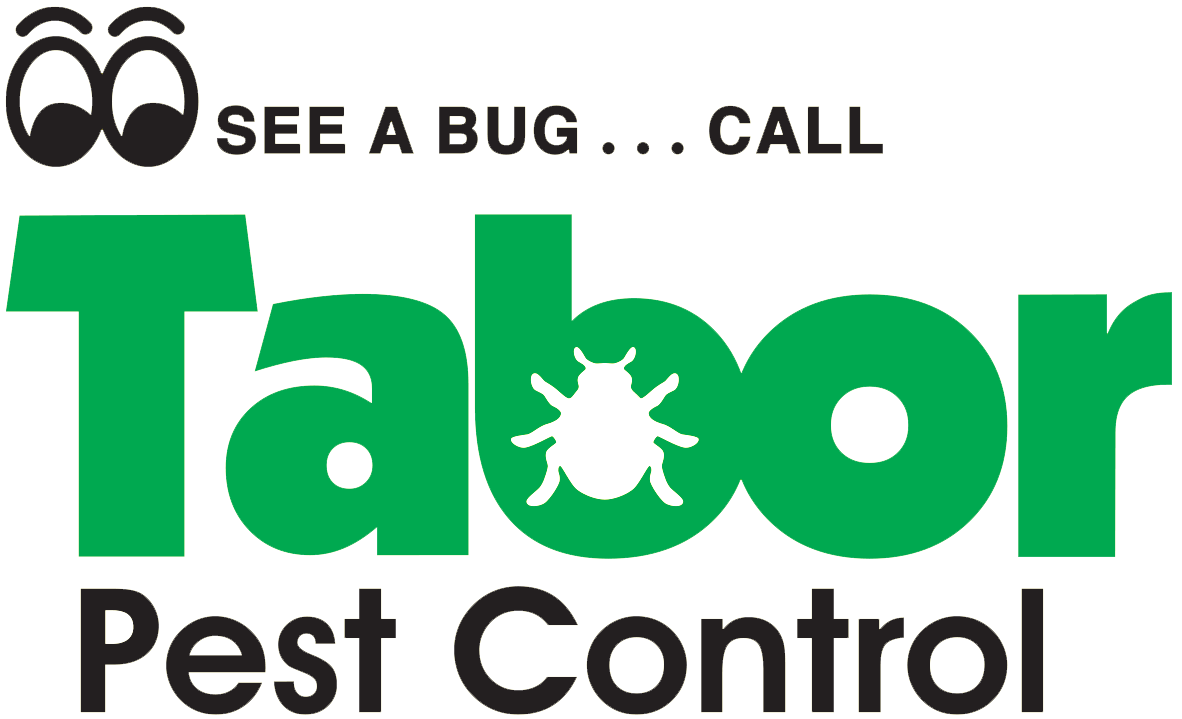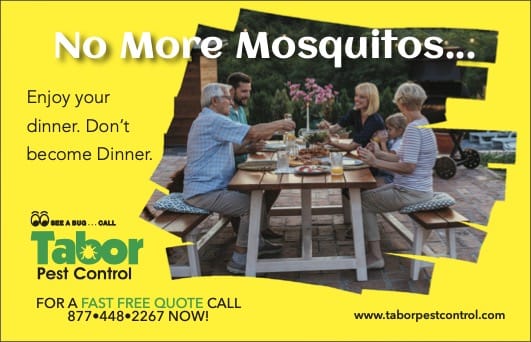The Pros and Cons of Mosquito Spraying: Helpful or Hazardous?
Beyond being an unrelenting pest and a universal nuisance, Mosquitos are the world’s deadliest animal. They are responsible for over 1 million deaths yearly, spreading life-threatening diseases, including malaria, yellow fever, and dengue.
While these insects do outnumber us by about 16,000 to 1, different methods of pest control offer some means of fighting back.
Mosquito Spraying is a very effective and fairly accessible control method that can deliver instant results. It’s a localized solution that helps prevent the spread of disease, supports public health, and limits exposure to these annoying and dangerous pests.
On the other hand, it raises questions of safety for the environment, humans, and pets. Its effectiveness is fairly short-term and non-targeted, failing to address the source and potentially causing the development of resistance.
What are all of the different methods of mosquito control?
There are three main approaches to combating mosquitoes: source reduction, biological control, and personal protection.
1. Source Reduction
Source reduction involves eliminating areas where mosquitoes can breed.
- Effective construction and maintenance of infrastructure can reduce mosquito breeding habitats. Mosquitos breed in still water that gathers in ditches, retention ponds, and water management structures that fail to flow effectively. Planning this infrastructure with the intention of limiting breeding habitats helps to control the mosquito population.
- Eliminating still water by filling wet areas with soil and draining outdoor containers such as trash cans will force mosquitoes to breed elsewhere.
- Modifying landscapes to ensure the effective drainage of water is another important piece of source reduction.
2. Biological Control
Biological control is used to eliminate existing larvae and adult mosquitoes.
- Introduction of predators such as birds, fish, and frogs has been shown to have some impact on controlling mosquito populations.
- Larviciding introduces low concentrations of chemicals to still water to kill off mosquito larvae and pupae without impact on other water-inhabiting organisms.
- Adulticiding uses trucks and aircraft to spray pesticides and kill mosquito populations. This method will be closely examined throughout this article.
Treating large areas with larvicides and insecticides can be difficult and dangerous. It is best left to professionals. The Tabor Pest Control team follows strict guidelines and regulations to ensure environmental and personal safety and ensure effectiveness.
3. Personal Protection

Personal protection creates physical or chemical barriers between people and mosquitoes.
- Spray-on repellent confuses mosquitoes and prevents them from seeking us out.
- Nettings such as pool cages and bed nets physically prevent mosquitoes from reaching us.
- Foggers, candles, and mists apply repellents to large areas so that they do not need to be applied to us directly.
What is Mosquito Spraying?
Mosquito spraying is a method employed to reduce mosquito populations in target areas and combat the spread of mosquito-borne diseases. The process involves the strategic application of insecticides in areas known to harbor and breed mosquitoes.
Commonly used insecticides include pyrethrins, organophosphates, and larvicides. Spraying can be carried out using various methods, including ground-based sprayers, truck-mounted foggers, or aerial spraying, depending on the size and accessibility of the target area.
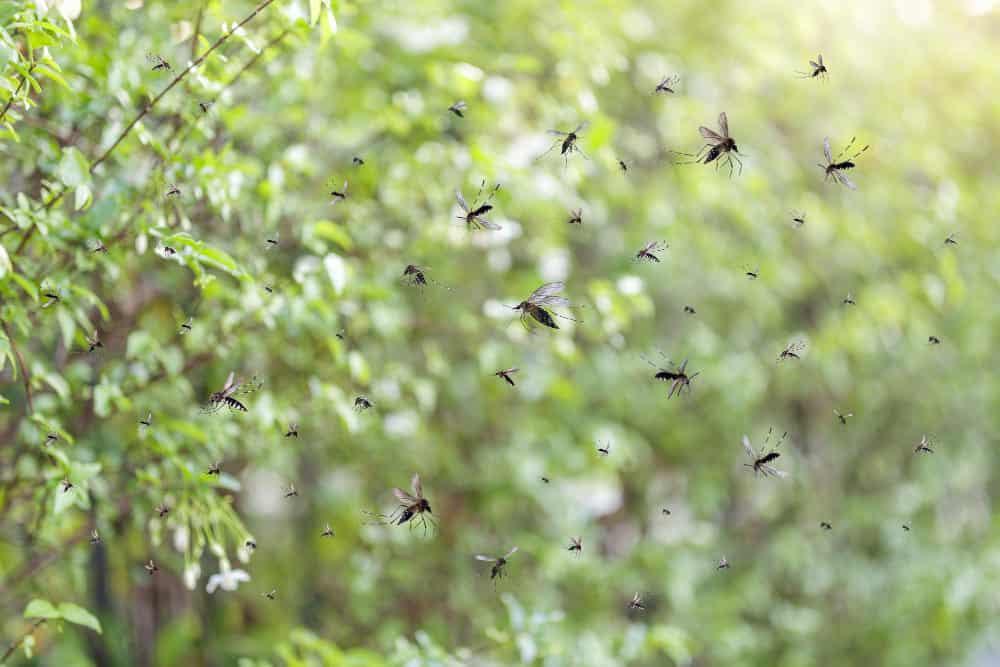
The primary goal of mosquito spraying is disease prevention and public health protection, but it can also be a quality-of-life measure for those in mosquito-prone areas.
It’s typically conducted by trained professionals who follow regulations and guidelines to ensure the safe and effective application of insecticides.
What are the Different Types of Mosquito Spraying?
Ground-based Sprayers:
- Utilized for smaller areas like residential neighborhoods or local parks.
- Involves professionals using handheld or backpack sprayers to apply insecticides.
- Allows for precise targeting of mosquito resting areas and breeding sites.
If your mosquito issue is getting out of hand, call the team at Tabor Pest Control to decide if this type of residential treatment is right for you.
Truck-mounted Misters:
- Ideal for larger areas such as parks, golf courses, or commercial spaces.
- Mounted on trucks equipped with spraying equipment.
- Releases a fine mist of insecticides to cover larger areas efficiently.
Aerial Spraying:
- Conducted by aircraft, making it suitable for vast or inaccessible areas.
- Involves releasing insecticides as a mist or ultra-low volume (ULV) spray.
- Provides effective coverage over large expanses of land, including rural or marshy areas.
Barrier Treatments:
- Focuses on treating specific areas, such as yards, gardens, or outdoor event venues.
- Involves applying insecticides to vegetation, structures, and other surfaces where mosquitoes rest or seek blood meals.
- Creates a barrier that repels or kills mosquitoes, reducing their presence in designated areas.
What are the Pros and Cons of Mosquito Spraying?
Pros
Mosquito spraying is effective, accessible, and localized, providing quick results to prevent the spread of disease and improve quality of life.
Effectiveness
- Mosquito spraying, when properly executed, can significantly reduce mosquito populations in treated areas.
- Targeting adult mosquitoes in their resting and breeding sites interrupts their life cycle, curbing their reproduction and population growth.
Accessibility
- Hiring an expert to spray for mosquitos is a fairly quick and easy process.
- Spraying can be done in small residential areas or large rural properties.
Speed of Results
- Within a short period, the application of insecticides can lead to a noticeable reduction in mosquito activity, providing immediate comfort to affected communities.
Disease Prevention and Public Health
- Mosquito spraying plays a vital role in preventing mosquito-borne diseases, thereby safeguarding public health.
- By reducing mosquito populations, it minimizes the transmission of diseases such as malaria, dengue fever, Zika virus, and West Nile virus.
Localization
- Mosquito spraying allows for targeted control efforts, focusing on specific areas with high mosquito activity or disease prevalence.
- This localized approach optimizes the allocation of resources, effectively addressing mosquito-related concerns where they are most needed.
Quality of Life Improvement

- By reducing mosquito populations, spraying enhances the quality of life for individuals living or working in treated areas.
- It enables people to enjoy outdoor activities, such as picnics, barbecues, and sports, without constant annoyance or the risk of mosquito-borne diseases.
- It helps eliminate the need for constant application of spray repellents, candles, and foggers.
Cons
Mosquito Spraying is a short-term solution that fails to address the source of the issue. It raises concerns regarding the environment, health, and resistance development.
Environmental Impact
- Insecticides can have a negative impact on non-targeted insects if done recklessly. Insects like bees and dragonflies can be affected.
- Killing large populations of mosquitoes can also create problems for their natural predators by eliminating a food source.
- This leads to a lack of biodiversity.
Health Concerns
- Prolonged or improper exposure to insecticides can lead to respiratory issues, skin irritations, or other health problems, particularly for vulnerable individuals.
- Similar outcomes may arise for pets and wildlife.
Resistance Development
- Frequent and indiscriminate use of insecticides can lead to the development of resistance in mosquito populations.
- Over time, mosquitoes may become less susceptible to the chemicals used in spraying, rendering control efforts less effective in the long run.
Failure to Address the Source
- Mosquito spraying primarily targets adult mosquitoes, often overlooking the breeding sites where mosquitoes reproduce.
- Neglecting the elimination or treatment of stagnant water sources can result in a continuous cycle of mosquito populations and re-infestation.
Lack of Sustainability of Results
- Spray treatments generally last 4-8 weeks before populations return to normal levels.
- This means that the treatments have to be regular and continuous.
How Does Mosquito Spraying Compare to Other Methods?
Mosquito spraying has some distinct advantages and disadvantages when compared to other methods.
Source Reduction Methods
Spraying insecticides is much easier and more accessible than systematically eradicating mosquito breeding grounds. It does not require any terraforming or rebuilding of infrastructure. In some cases, it is completely impractical to eliminate all potential mosquito breeding habitat.
On the other hand, source reduction is a far more sustainable method of controlling mosquitoes as it can reduce populations in a given area permanently.
Personal Protection Methods
Mosquito spraying is generally a longer-lasting solution compared to repellants. It frees individuals from the burden of constantly reapplying bug spray, lighting candles, or running bug foggers. It also allows the freedom to enjoy the outdoors beyond a netted area.
Additionally, by killing the mosquitoes rather than repelling them, it tends to be a more definitive and effective solution.
Compared to repellants, mosquito spraying poses a bigger threat to organisms and the environment. It can also be more expensive as it is not usually a DIY solution.
The Tabor Pest Control team is always ready to answer your questions. Give us a call to decide which mosquito control approach is best for you.
Frequently Asked Questions
Does mosquito spray harm beneficial insects?
Yes, mosquito spray can harm beneficial insects such as bees and butterflies. Insects are an essential part of the ecosystem, and they play a vital role in pollination and maintaining balance in the food chain. When you spray your yard for mosquitoes, you also kill off that food source and make it more difficult for birds to successfully reproduce. It is important to consider the impact of mosquito spraying on beneficial insects before deciding to use it
Can mosquito spray be dangerous for pets?
Yes, mosquito spray can be dangerous for pets. Some mosquito sprays contain chemicals that are toxic to pets, and exposure to these chemicals can cause serious health problems. It is important to keep pets indoors or in an area away from sprayed areas for several hours after spraying.
What are the potential health risks of mosquito spraying for humans?
Mosquito spraying can pose potential health risks to humans, especially those with respiratory problems. The chemicals used in mosquito sprays can irritate the lungs and cause breathing difficulties. In addition, exposure to these chemicals can cause skin irritation and other health problems. It is important to follow the instructions on the label and take precautions to minimize exposure.
Is mosquito spraying worth the cost?
The cost of mosquito spraying can vary depending on the size of your yard and the frequency of spraying. While mosquito spraying can be effective in controlling mosquito populations, it is not a permanent solution.
References
- https://www.rti.org/insights/mosquito-facts
- https://a-z-animals.com/blog/how-many-mosquitoes-are-in-the-world/
- https://lcmcd.com/faqs/q-what-methods-are-used-to-control-mosquitoes/#:~:text=There%20are%20four%20basic%20approaches,source%20reduction%2C%20larviciding%20and%20adulticiding.
- https://www.orkin.com/pests/mosquitoes/what-eats-mosquitoes
- https://www.buzzoffmosquitosolutions.com/difference-between-mosquito-fogging-vs-spraying
- https://activepestcontrol.com/mosquitoes/treatment/how-long-does-mosquito-treatment-last/#:~:text=For%20the%20most%20part%2C%20mosquito,size%20of%20the%20mosquito%20population.
4 Reasons Why Large Roaches Love Your Space (& How to Evict Them!)
Nobody likes coming face-to-face with a roach. But when you suddenly see giant roaches randomly in your house, it’s an issue that needs to be immediately solved. They say cockroaches are the most resilient pests and can survive on anything.
As unsettling as it is to see one huge cockroach, it might not be the only one. There’s a huge possibility of you finding others infesting your property. Finding why you’re suddenly spotting them could help you identify ways to get them out and take preventive measures.
Let’s see what cockroach species could be infesting your home and why you suddenly see big roaches.
Why are roaches attracted to my home?
Our homes are ideal for cockroaches to settle down and multiply further. Cockroaches like warm and humid places. Another factor is the availability of food, all readily available in our homes.
1. Availability of food
As much disgusting as they’re to look at, roaches can survive on anything, irrespective of it being the dirtiest thing in the world to consume. Unlike humans, they don’t even need food and can go for 3 months without eating anything.

Roaches like to consume all kinds of things. But they’re more attracted to starches, sweets, greasy foods, and meats.
Your dirty plates, dirty kitchen, and overall unsanitary house are welcoming spaces for them. They also don’t mind if you have a lot of garbage piled up because that’s what attracts them.
Mentally prepare yourself to find roaches in your washroom drain if you don’t regularly clean it. They can eat anything from soap, hair, and toothpaste.
2. Hospitable environment
Have you ever seen roaches walking around in the middle of the day inside your home? The possibility of seeing a roach in daylight is quite rare because they are nocturnal pests.
They like to walk around at nighttime, and your lights are off. That’s when they come out to find possible food and roam around places you can’t imagine.
During the day, they would remain hidden in dark places where you can’t see them, such as drains, behind picture frames, or areas you don’t clean often or often reach towards, such as attics.
Some species don’t even mind a clean home and would just enter through narrow, open cracks.
3. Humidity and water
Roaches love to live near a place with plenty of humidity and water availability, and that’s why drains are their homes for most of the time.
If you have a leaky pipe or your washroom leaks, that would attract roaches, and they will gather around any moist areas.
4. Outside area
The chances of roaches infesting your home increase if you have a garden space. You could be leaving spare wood around or have a pile of garbage, or even something like a leaky water pipe or hose could be an attraction to them.
From there, entering your home isn’t a big deal for them as they could enter through small holes or cracks and even through the front door if you don’t have a habit of closing it during the daytime.
Identifying the big roach
There’s a huge possibility that if you see a giant cockroach in your house, it’s an American cockroach. These are reddish brown and range in length from 1.5 inches to 2 inches, the largest house-infesting cockroach in the country.
The American cockroach lives outdoors in damp, moist areas with temperatures above 70 degrees Fahrenheit.
The male can live up to 362 days, and females can live up to 706 days.
Though they like to live in pipelines and drains where suitable living conditions exist for them, during the rainy season, when drains flood, they move out and into homes.
Signs of cockroach infestation
Cockroaches are nocturnal pests and tend to move at night, so you won’t openly see them in broad daylight. During the night, they tend to wander around and get food for themselves. So how will you identify them infesting your home?
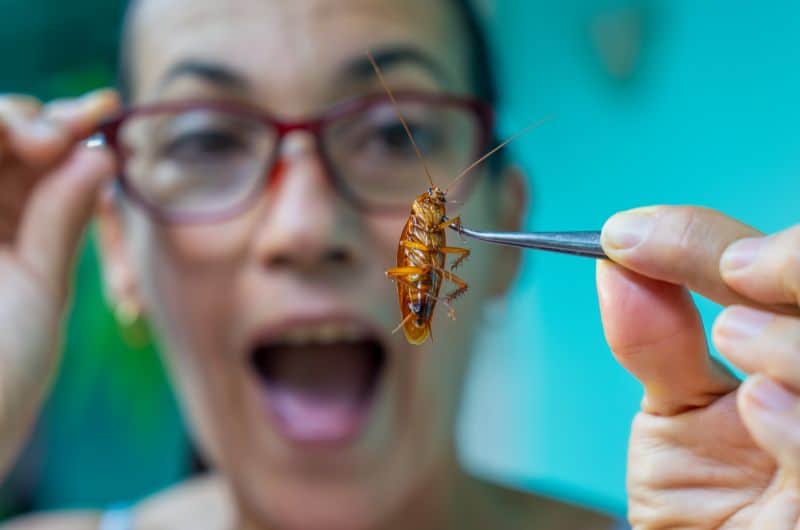
You obviously can’t stay awake at night searching for them, but you can look for signs of their presence in your home.
- Cockroach droppings might differ depending on the species. Look out for their droppings near the drains, behind kitchen appliances, and in food storage areas.
- Their egg cases are oblong and brown and are found in hard-to-reach places. You might find them behind furniture, in pantries, between cracks in the walls, in books, or other tightly sealed places.
- If you smell a musty odor, it’s caused by the pheromones that roaches emit to attract other roaches.
- Seeing live cockroaches is the biggest sign.
How can you prevent a roach infestation?
Invading your home, cockroaches seem to hide in secrecy and grow in numbers without you knowing about their existence. While they’re growing in numbers, they could be damaging your property or secretly causing harm to your health.
Roaches are known to spread diseases due to the unsanitary ways they live and eat.
Understanding why roaches are attracted to your home can help you take the necessary steps to get rid of them.
Sealing cracks and gaps
If you aren’t careful with the structure of your house and its repairments, small holes or cracks could easily form, giving way to roaches inside your home.
These could be anywhere near the windows or doors, inviting the cockroaches to enter.
If you don’t close your doors and windows properly or don’t have a window screen and often leave windows open, then that’s a perfect opportunity for roaches to invade your home.
Clean home
A neat and tidy home would be the best way to avoid roaches and ban their entry. If you’re being lazy about the upkeep of your home, then no wonder you’re finding roaches inside.
- Avoid leaving dirty dishes anywhere in your home. Don’t even leave them in the sink overnight.
- Close all the doors and windows. Close the kitchen cabinets as well.
- Don’t leave food outside; if you do, keep it in an airtight container.
- Ensure your bathroom has no leakage or anywhere else in your home.
- Keep your bathroom tidy and dry at all times, and you should air it out daily to avoid the build-up of humidity.
- Take out your trash regularly.
- Don’t leave any pile of wood or trash near or around your home.
- Do a deep cleaning of your entire home once a month so there’s no way for roaches to hide around your house.
Getting rid of roaches
Dealing with small roaches is still fine, as you can use a bug spray. But dealing with giant cockroaches is a different deal altogether.
Big roaches could also mean you already have a big family living inside your home, so dealing with them would mean you need more than just bug spray.
Glue strips and traps
Just place glue strips where you suspect there’s roach activity, or you could just put them where you think roaches could come out during the night.
You can use it instead of using harmful chemicals if you’ve children or pets living with you.
Gel bait
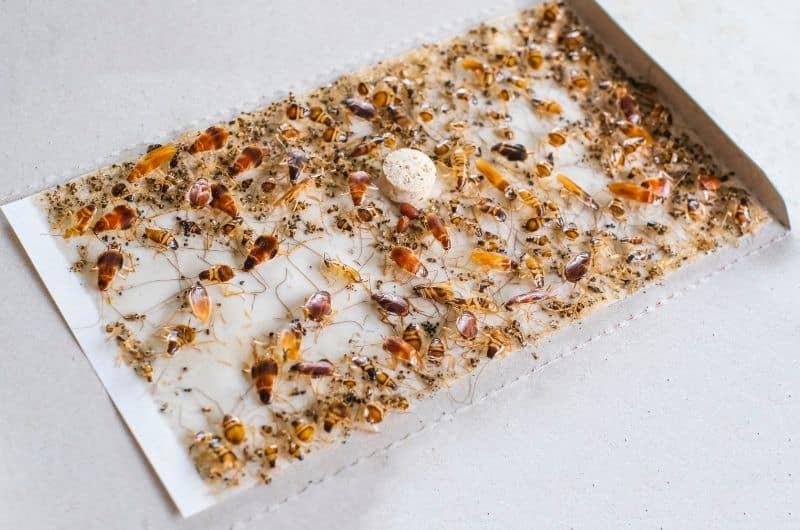
It’s a popular way of catching roaches. This toxic substance can be applied in small amounts where you think there’s roach activity. The cockroaches ingest the gel bait and then die within a few hours.
Home remedies
There’re several home remedies that you can use instead of thinking about using insecticide. These are inexpensive ways of dealing with roaches that have infested your home.
Baking soda, boric acid, borax, citrus, essential oils, and caulk are some affordable things that can be used to either kill or deter them.
When to hire pest control service
Let’s say you’re ready and prepared with a bunch of home remedies to deal with the giant roaches in your home, but you don’t know where they’re coming from!
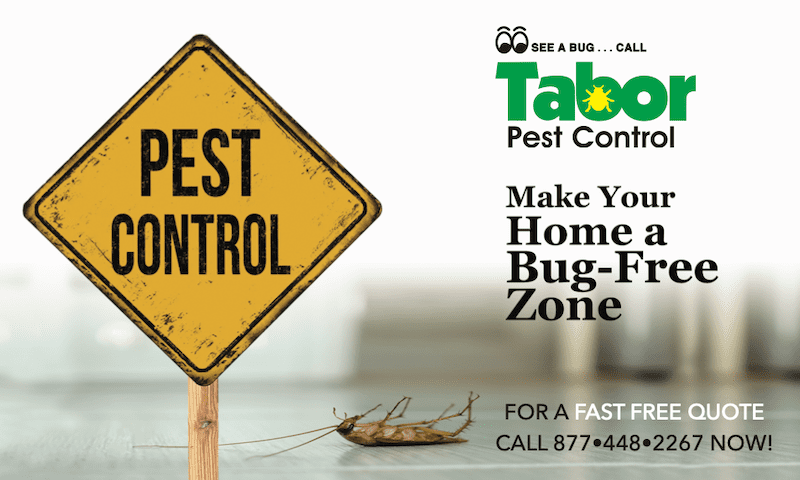
It’s scary to think where those giant roaches must be coming from and where they hide. What’s more alarming is that now you can’t seem to sleep at night knowing that those giant roaches might be on the move during the night.
That’s where Tabor Pest Control comes in and saves the day. This is how we’ll take matters into our own hands:
Inspection is the key
The most important thing is identifying the pests and where they might be living in your home. In this case, our professionals will thoroughly inspect your property and look for areas where roaches might be living.
Along with identifying the species, we’ll also identify places where roaches might be entering your home.
Dealing with infestation
Our professionals are experts and possess in-depth knowledge about how to deal with roaches, including all the different species found on your property.
Based on the inspection, our team will develop a treatment plan and inform you of how things unfold.
Whether using chemical substances would be better or using other ways to deal with the infestation would entirely depend on the initial inspection and the current situation of roach infestation on your property.
Rest assured, we at Tabor Pest Control will find an effective and safe way of dealing with cockroach infestation in your property while ensuring they don’t infest your home in the future.
FAQs
What does it mean if I see a big roach in my house?
Seeing a giant roach in your house could mean a couple of things. Either it could be a single cockroach which also means it’s also pregnant, and that would mean you would see little roaches soon that would be starting a colony.
It could also mean that there are a lot of roaches in your home, but you haven’t been able to identify their living space, so they’ve grown big and also in numbers.
What smells attract roaches?
Roaches could be attracted to anything from the smell of food to anything that’s rotting in your home or even a suitable living condition.
They are most attracted to starch, sugar, grease, meat, and cheese. Rotting food could also be attractive to them.
Are cockroaches harmful to humans?
Cockroaches roam around everywhere and don’t care if it’s garbage, a rotting animal, or food. As disgusting as it sounds, remember that it could also be roaming on your food that hasn’t been covered.
This is why they also carry several diseases, including salmonella and gastroenteritis.
Should I be worried if I saw one cockroach?
It’s definitely a reason to be concerned because a cockroach is a social pest, which means others are present nearby. They can contact others, and that means others are nearby.
How to Stop Ants from Invading Your Bathroom: Identification and Prevention Tips
When it comes to unwelcome guests, ants might seem like the least of your worries. After all, they don’t seem to cause as much of a fuss as their pest cousins. But don’t let their small size fool you; these critters can be a real pain in the neck, especially when they turn up where they’re least expected, like in your bathroom.
You’d think they’d stick to the kitchen, right? After all, that’s where the food is! But surprise, surprise – ants aren’t just foodies. They’ve got a knack for finding the perfect living conditions, and your bathroom ticks all the right boxes.
So, if you’re scratching your head, wondering how ants ended up in your bathroom, hold on to your hat because the answer might just blow your mind.
Why are ants attracted to the bathroom?
The bathroom could be a perfect hiding spot for ants and the right place for them to build their colonies. It’s the ideal moist, dark, and damp place for them to live.
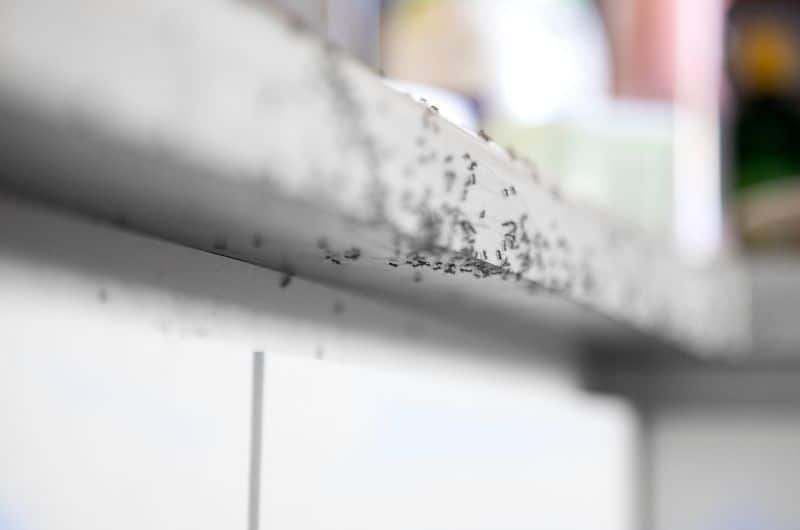
You could be thinking about how they would get their food in a space like this. Well, ants aren’t picky eaters at all, and unlike us, who would want to eat proper meals on our dining table, they could very much stay alive just on anything, including your hair, amongst other things.
Here are some of the other reasons why ants are in your bathroom:
- Perfume scents
- Soaps
- Body lotions
- Open toothpaste
- Rotten hair
Signs of ants in your bathroom
Before we get into how you can identify signs of ants in your bathroom, other than seeing them yourself, it’s essential to know that several parts of your bathroom would attract them.
These include:
- Damp and dirty floor mats
- Clogged drains
- Trash cans in the bathroom
- Chemical odors from pipes
- Dirt and grime in nooks and crannies
Ant debris
One of the common signs of ants living in your bathroom is the presence of ant debris. It’s what ants leave behind and can be described as piles of dirt or sand as they dig their nests.
You might also find their discarded wings, a positive sign of ants living nearby and growing their colony.
Small holes
If you’ve wooden cabinets or any wooden work done anywhere in your bathroom, look closely for small holes.
This is a sign that there’re ants nearby and a specific sign of carpenter ants which can cause significant damage to the wood.
Dampness
Another thing you should closely look for in your bathroom is a sign of dampness or any musty smell that signifies that your bathroom has water issues. Somewhere in your bathroom, water is leaking and creating issues.
This dampness creates a perfect environment for the ants to live and grow their colonies.
Seeing ants
Of course, the final nail in the coffin is that you would physically see ants in your bathroom. Now you might only see a couple of them, but that doesn’t mean there aren’t more in your bathroom.
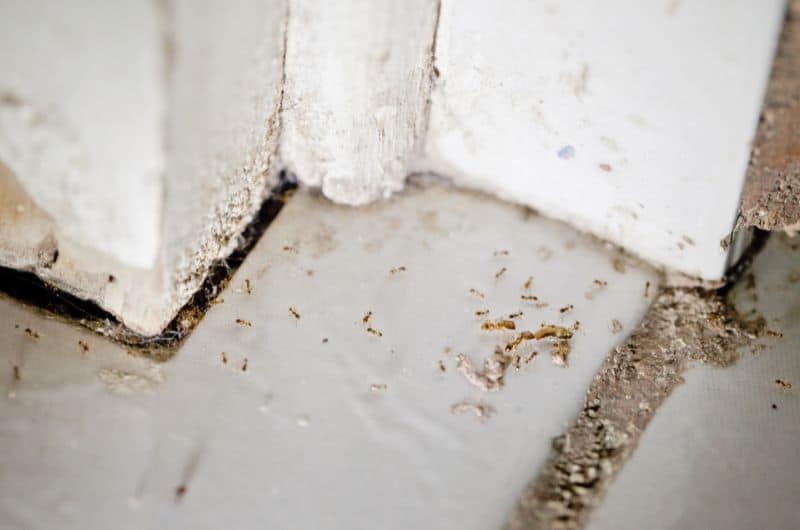
In fact, seeing a couple is a worse sign that there might be too many ants somewhere you don’t know, and they have grown in such numbers that they’re out and about roaming freely.
Since they can easily live inside a tiny hole, you might not be able to spot their colony on your own.
Popular ant species in South Alabama and South Georgia
Seven kinds of ant species are commonly found in South Alabama and Georgia. Although they usually nest outdoors in the top 6 feet of soil, they might also be widely found anywhere inside the home.
1. Argentine ants
These are the most commonly found ant species you’ll find. Due to unusually low levels of intraspecific aggression, the Argentine ant can establish large colonies.
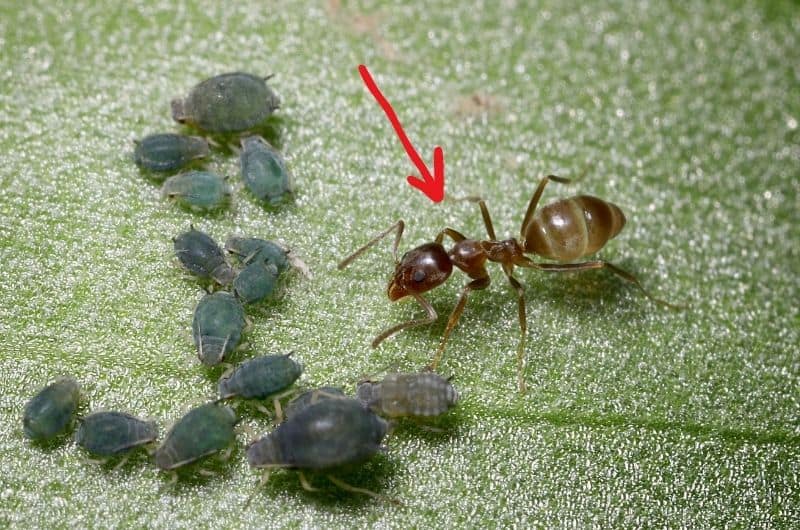
This is why they tend to spread quickly and can establish large colonies. Another fact about these ants is that they negatively affect the facilitation of plant-feeding pest insects and disrupt native ants, pollinators, and even vertebrates.
Argentine ants are dark brown in color and range between 2.2 to 2.8 mm long. They’re wingless with a 12-segmented antenna and emit a musty odor when crushed.
They aren’t directly dangerous to humans as they don’t bite or sting. But they are much more of a nuisance especially because of water availability. So, finding them in your bathroom could be quite a common sight.
They’re carriers of disease-causing bacteria for conditions like dysentery since they crawl over sewage, trash, and dead animals to get to their food source.
2. Southern Fire ants
Southern fire ants are commonly found nesting in open areas in soil or under stones. You can identify them by their often concolorous dark color and could be bi-colored with a redhead mesosoma and a black gaster.
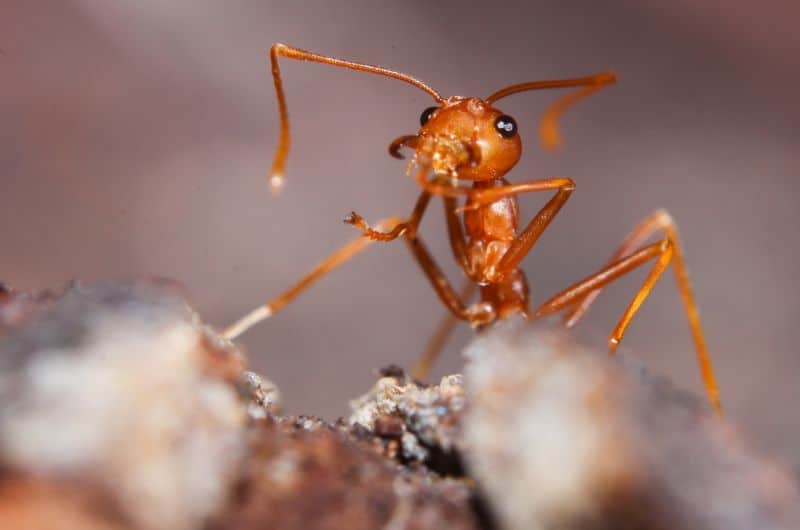
Their sting is quite painful and leaves a burning sensation which could easily turn into itchy welts, often in a circular pattern. The welts could also turn into blisters.
It could sting multiple times unless and until you remove or kill them.
3. Little Black ants
This species is common in wooded areas, and in yards, you can find them under rocks, rotting logs, and piles of bricks and lumber. Indoors they could be near woodwork, wall voids, decaying wood, masonry, and behind facades.
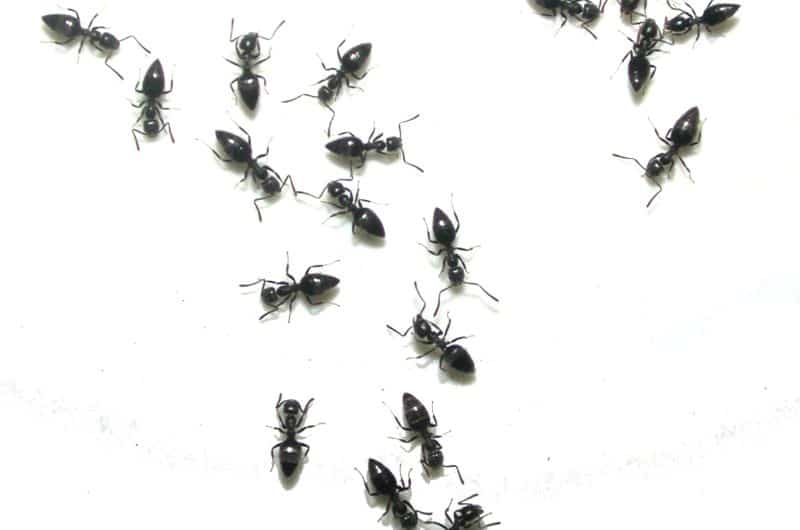
It’s easier to identify them as they’re black or dark brown in color and are easy to spot. You won’t have to worry about their sting as it’s too small and weak to be effective.
4. Carpenter ants
They’re quite famously known for building their nests by excavating wood and forming smooth tunnels inside the wood. Their size can vary, and black ones are quite common. Though they might be a combination of black and red or completely black, red, or brown.
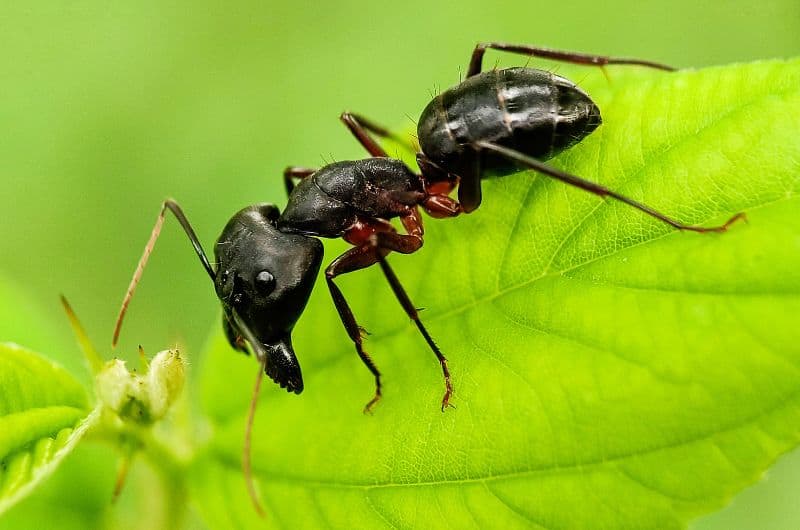
Their presence can be detected easily, as indicated by a rustling sound coming from wall voids or wood where the nest is located.
Thankfully their bites aren’t venomous, and neither do they transmit diseases.
5. Odorous House ants
Odorous house ants are given this name because they like to eat sweets and are fond of honeydew. They often nest near moisture sources, such as in wall voids near hot water pipers, in heaters, beneath leaky fixtures, and inside wood damaged by termites.
You don’t have to worry about them so much as they don’t pose a public health risk, but they can contaminate food and should be avoided.
6. Pavements ants
Pavement ants consume just about anything from insects, seeds, honeydew, bread, meats, nuts, and cheese. Inside the home, they can be found nesting in walls, insulation, and under floors.
These black ants don’t pose a public health risk but can contaminate your food.
7. Pharoah ant
You can recognize them by their usually pale, varying from yellowish to reddish, with the abdomen often darker to black in color.
They live in large colonies with workers numbering in the thousands and nest in warm and humid areas near food and water sources.
These species of ants are carriers of dozen disease pathogens, including salmonella and Streptococcus pyogenes.
Preventing ants in your bathroom
You need to create an inhospitable environment for ants so they don’t enter your bathroom anymore and are forced to leave your peaceful space alone.
A. Keeping your bathroom clean and dry
- Keep your bathroom as clean as possible. It would be best to clean it daily with a deep once a week, including scrubbing the tiles, the area surrounding the basin, shower curtains, etc.
- Mop regularly, including the hidden areas, such as behind the toilet.
- Unclog your drain regularly.
- Clean your bathroom mats often and replace them if they can’t seem to get clean anymore or smell even after cleaning.
B. Sealing cracks and openings
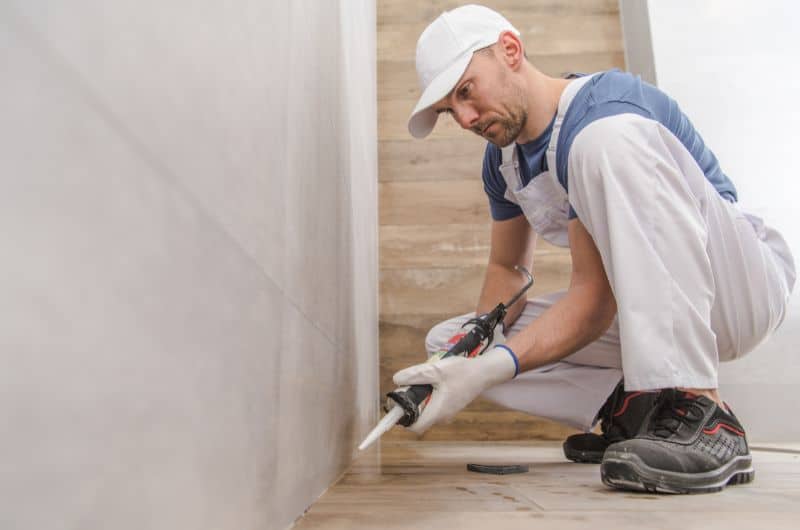
- Seal all the cracked window corners or anything small cracks you might see in the bathroom.
- If there’re any damaged or broken tiles, they should be replaced, or else they might give an opening to ants to create colonies.
- If wooden cabinets have become too old and have started to rot, they should be replaced; otherwise, they’ll keep attracting ants.
C. Leakages and humidity
- After a shower, ensure no steam build-up in the bathroom. Turn on a fan and open the door or windows to let the steam out.
- After a bath, ensure the bathroom doesn’t stay wet; if there’s water somewhere, it should be immediately cleaned up.
- Keep all the products that you keep in the bathroom closed up tightly.
- Get a plumber to check all the plumbing in the bathroom once a month so there’re no secret leakages.
By following these helpful tips, you can prevent ants from invading your bathroom in the future, and it’ll remain clean and sanitary.
Why are there ants in my bedroom?
Your bedroom and bed are a space where you lie down to relax and sleep; this is the last space where you would expect to struggle or face any problem. Finding ants anywhere in your bed or bedroom can come as a huge surprise and not of a good kind!
Ants are such tiny creatures that they can go about anywhere and travel to any place in your home. While finding one or two in your bedroom isn’t that big of a deal as you can quickly get rid of them. But finding a lot of ants can be problematic.
A messy kitchen always attracts ants. As they’re constantly trying to find a place with suitable living conditions, a bedroom isn’t a faraway space for them to be.
While moisture, dampness, food, and water are all ants need to thrive as a colony, you must wonder if you’ve accidentally made your bedroom perfect for ants.
Finding ants in the bedroom shouldn’t be surprising if you occasionally or constantly eat food there. Even if you think you’re being careful, little food crumbs will always be on your bed or bedroom floor. A carpeted floor has more of a chance of having food crumbs in it.
Think from the point of view of an ant. They can easily survive on small crumbs of food, and if you’re eating in your bedroom, leaving dirty plates, or dropping food, it’s a paradise for them. That’s how you’ll find a trail of ants in your bedroom or, worse, on your bed.
You’ve to stop eating or bringing food into your sleeping space. This is the only way to prevent ants from entering your bedroom. Eat your meals in the kitchen or dining room!
Getting rid of ants in your bathroom
Even though ants aren’t as dangerous of a pest, it’s still annoying to see them. You don’t want to take a shower and see ants on your bathroom floor or crawling on the walls.
To get rid of them, some home remedies you can use in your bathroom includes:
White vinegar
Using white vinegar successfully eliminates ants as it interferes with their pheromones. Since this is how they find a way around things, eliminating them is easier.
Just wipe wherever you feel the ants might be getting inside, such as your sink, mirrors, cabinets, walls, etc.
But it doesn’t work on natural stones like quartz, marble, and granite.
Boric acid
Boric acid is mildly hazardous to children and animals, so be careful when applying it in your bathroom. Sprinkling it over surfaces where ants might be emerging can help. Create a line over corners.
Borax
This chemical is hazardous to ants and causes damage to their outer skeletons and digestive systems. While you can find it in regular household products like toothpaste, mouthwash, and lotion. But to ants, this can be dangerous. You can mix it with peanut butter or jelly and leave it along the ant’s trails to attract them to it.
Other household items that can help you eliminate an ant situation in your bathroom include:
- Citrus peels are toxic to ants
- Cayenne pepper, cinnamon, garlic cloves
- Coffee powder
- Essential oils
Ant traps and baits
While natural remedies can help you so much, you can also use commercial ant traps and baits to eliminate ants. These traps and baits attract ants and then poison them.
They’re not difficult to use and place them in areas where you think ants live. Or somewhere where you see them most of the time in your bathroom.
Just follow the instructions correctly, and these might be able to get rid of ants.
When to call the professionals
Only so many natural remedies and ant traps can help eliminate ants in your bathroom. It’s okay to use them if you see a few ants. Using such remedies can eliminate them.
But you could have a whole ant colony living in your bathroom, and you wouldn’t know what to do about it on your own. An entire ant colony is challenging to deal with and requires professional assistance.
Our professionals at Tabor Pest Control have the right tools and more potent chemicals to deal with an ant infestation in your bathroom.
It’s better not to take a chance when it comes to ant infestation as it could spread to other parts of your home through drains and ventilation and might end up causing you various health issues by contamination.
At Tabor Pest Control, we can assure you that our services will help you eliminate ant colonies and get your bathroom back to the relaxing space you want it to be!
Contact us today
FAQs
How do I get rid of ants in the bathroom drain?
Ants love moisture, and damp places and drains are the perfect places to crawl in and out of. Finding ants around your drain shouldn’t be a surprise since this is also where they’ll find their food.
You can do so by mixing equal parts baking soda and white vinegar and pouring it down the drain.
To eliminate the ants, you’ll see foam forming, producing carbon dioxide, and clearing any clogging in your drains.
Pour some hot water once you stop seeing foam, which will flush out anything down there. Then, if you’re still facing issues, don’t hesitate to call professionals at Tabor Pest Control to terminate an ant infestation at your home.
How can I get rid of flying ants in the bathroom?
Flying ants can be a nuisance, and although they aren’t flying cockroaches, you still need to get rid of them as they buzz around like mosquitoes.
It’s best to use essential oils like peppermint oil and create a mixture to spray on the flying ants to get rid of them.
For example, mix 2/3 of water and 1/3 of liquid dish soap thoroughly in a spray bottle, and then add a few drops of peppermint oil.
Why are there ants in my bathroom but nowhere else?
If you see ants only in the bathroom, that could indicate it’s a perfect place or environment for them to live in. You could have a leaky pipe somewhere, causing ideal dampness or humidity in your bathroom, which attracts ants.
It’s essential to have a dry bathroom at all times when you’re not using it and to have proper ventilation to prevent any humid conditions. Also, check your windows properly because even if there’s a small crack, it could easily lead ants through there.
Wasp Attack: How To Get Rid Of Wasps In House?
Wasps are considered one of the most dangerous pests to infiltrate your home. Their sting releases venom into our skin and its surrounding tissue. This results in immediate pain, inflammation, and swelling and, in rare cases, leads to life-threatening events.
So, running away and hiding inside is pretty common when you suddenly see a wasp coming your way. But what about finding a wasp inside your home instead? Of course, you’ll panic and want it out of the house immediately.
According to CDC, there were 1,109 deaths from hornets, wasps, and bee stings between 2000-2017, with 62 people losing their lives.
It becomes all the more important to get rid of this winged insect and get it done safely so it doesn’t come back again or end up stinging you in the process!
So let’s see different ways to remove wasps from your home safely.
4 types of wasps common in South Alabama and South Georgia
Wasps are common pests in the US throughout the summer months.
While they could be attracted to your home or around your home for reasons like the availability of food, shelter, sugar, and flowers, they’re not a pretty sight and are often dangerous to be around.
Here’re some of the common wasp species to watch out for if you’re living in South Alabama and Georgia region:
1. Paper Wasp

This species is known as a paper wasp because their nest is made of paperlike material, fashioned wood that the females have chewed from dead trees, fence posts, or unpainted building lumber and mixed with saliva to form a paste.
Their nest usually has about 100 cells. They are 16mm in size with orange antennae, wings, and tarsi.
You can recognize them as their body may be jet black or brown with narrow yellow bands and paired segmental spots.
Of course, their sting is painful, but they don’t attack unless and until their nest is disturbed. So, they rarely sting as they mostly shy away from humans unless their nest is near your home.
2. Yellowjacket Wasp

This is another species of wasp commonly found in South Alabama and Georgia.
They’re also the most difficult ones to deal with. Especially ground and cavity nesting ones such as the western yellowjacket, which tends to defend their nests vigorously when disturbed.
During their season, the colony becomes larger. When things diminish in the fall, the species move to find food and shelter at random places.
They are medium-sized and black with jagged bands of bright yellow.
Their sting is smoother than other wasps, so you could be stung multiple times, only realizing it when the venom spreads, and the sting becomes painful. It gives severe pain and a burning sensation lasting for about 2 hours with swelling lasting for days.
3. Mud Dauber Wasp

Mud dauber wasp constructs their nest of mud. They are long and slender with a thread-like waist and are usually black but might have pale markings or a metallic luster.
They are not dangerous. If you see their nests with holes, they are inactive or old.
Since they aren’t aggressive and unlikely to sting, there’s not much danger, but still, you need to be careful of them.
If they end up stinging, the symptoms resemble a typical bug bite. However, their venom is mild, so you won’t experience severe pain or swelling like that with other wasps.
4. Bald-faced Hornets

Bald-faced hornets are a relative of the yellowjacket wasp. It gets its name due to the largely black color and mostly white face. Due to its large size and aggressive nature, it’s termed a hornet.
They have two slanted lines running from their midsection towards their head and on the latter part of their abdomen. Their upper midsection almost looks triangular from the side.
Their sting can hurt, itch, and swell up for about 24 hours, and since they’re aggressive, it’s most likely to happen. This is why a professional should remove them.
They have smooth stingers that can sting multiple times, unlike other wasps!
How can I identify a wasp infestation?
A wasp could enter your home by mistake in hopes of seeking shelter, or there could be a wasp infestation in or around your home.
None of us want to deal with a wasp infestation on our own, but if that’s the case, the situation is even worse than you imagined and far more dangerous.
This could lead to a halt in your activities and prove to be a major inconvenience.
You must become aware of a possible infestation so that you can call on professional services to deal with the situation.
1. Signs of wasp activity
If there’s only one swarming wasp and you don’t find others with it, it’s probably a stray you could deal with alone. But others could also be with it, indicating a possible infestation nearby.
Wasps tend to leave their nest to get food several times a day. You can notice this with the help of the buzzing sound they produce, which is loud enough not to ignore.
If there’s more than one, you can also hear others buzzing.
2. Locating nests inside or around the house
Wasp nests are dull grey or brown, resembling a paper ballon. There would be several patterns with layers, with different cells inside for wasps.

Once you’ve found the nest, which is pretty easy to locate considering the buzzing noise and the size of the nest, which is quite visible even from far away, you do not want to go near the nest without a proper plan.
3. Dangers of ignoring a wasp infestation
Usually, if you have a yard, it would attract wasps, mainly during the summertime. If the species of wasp isn’t aggressive, it won’t harm you unless you provoke them. They often leave once summertime is over.
However, there’re times when nest removal is of utmost importance. These instances include:
- Wasp stings hurt, but they could also be allergic to the extent that a person could end up losing their life.
- These nests don’t cause as much property damage as other pests, but there’s still some damage.
- People who have a wasp phobia
- The severe swelling and pain
Safety precautions when dealing with wasp
The worst thing you can do around a wasp is not following proper safety instructions.
If you have located a wasp in your home, be it one or more, you should take proper precautions around them.
If you’re considering using a bug spray, it doesn’t have much effect on these stinging insects. What would happen is they would get aggressive and come to sting you with more force. Instead, focus on the following steps:
1. Wearing protective clothing and gear
Wear appropriate clothes, including full-sleeve shirts, long pants, and shoes that expose no skin.
Tape your loose pants with the boots. This way, wasps can’t fly inside your clothing. Similarly, wear a tight-fitted shirt or t-shirt, leaving no room for wasps to get inside.
Wear light-colored clothing and avoid brightly colored, patterned, or black clothing. Another thing to focus on is if you’ve long hair, tie it so wasps can’t get inside and tangled in your hair.
You shouldn’t wear colognes, perfume, scented soaps, or powder as it attracts wasps. Also, don’t be barefoot when you know wasps are around.
2. Being aware of potential allergic reactions
Wasps don’t leave their sting in you. So they can sting multiple times.
A wasp sting will hurt some more than others and could be deadly. A typical reaction would be getting an inflammation that leaves your skin red with severe itching. You will feel as if your skin is burning, and stabbing pain will be present.
In severe cases, it could also lead to anaphylaxis, a potentially life-threatening reaction that may impair breathing and cause the body to go into shock.
You can disinfect the area and apply ice to reduce swelling. A significant allergic reaction could lead to swelling spreading over other body parts.
An allergic reaction could also lead to hives, abdominal cramping, vomiting, intense nausea or diarrhea, tight chest tightness, and difficulty breathing.
Immediately seek medical attention if you don’t feel well or witness the above symptoms.
3. Avoiding wasps during their most active times
It’s the summertime when wasps are most active. They would be building their nest nearby, and if you’ve got a yard, then there’s a huge possibility that it would attract wasps.
Avoid roaming your yard without proper safety precautions during this time. Even when you go inside, close your door correctly, and your windows should have a mesh screen to avoid insects getting inside.
3 DIY methods for removing a wasp nest
Don’t go near a wasp nest without taking proper safety precautions. You must follow safety regulations when trying to remove it yourself. However, the best solution to eliminate a wasp infestation is hiring professionals who can help you.
1. Soap and water solution
Try a soap and water solution if you see a small wasp nest. Mix two tablespoons of dish soap into a spray bottle of water and spray it directly on the nest.
Now, of course, you should wear appropriate clothes before attempting this, which isn’t a foolproof solution, and you could still get stung.
But the mixture of water and soap will clog the wasps breathing pores and successfully kill them.
2. Using a vacuum cleaner
You could eliminate wasps using a vacuum cleaner, although this isn’t feasible. A wet/dry vacuum can suck the wasps from the nest into a soap/water solution at the bottom.
Ensure the vacuum is in good working condition and has a long extension wire so you can move it around freely.
3. Wasp traps
People also use wasp traps which can get rid of them. These traps have a liquid that attracts wasps. So when wasps crawl into the trap, they get stuck and drown.
Replace these traps often to see if it’s working so new ones can get trapped and killed. It’ll only work if the nest is near your property but not where you often use that path.
When to call a professional
Although you might not fear the winged stinging insect that much and are willing to try killing them yourself, it’s neither recommended nor a good idea to do so.
A homeowner like yourself isn’t aware of the correct species or is trained in dealing with wasps. Dealing with wasps includes many precautions, and the risk of removing the nest is high as it could be deadly.
Trying to knock it down is the worst idea, so don’t even try to attempt it. It’s better to rely on trained professionals to deal with wasps.
This is what we at Tabor Pest Control are trained to do. With our expertise, safety equipment, and wasp removal methods, we can easily and effectively remove wasps and their nest from your property without causing property damage.
We at Tabor Pest Control do proper property inspections as our professionals are trained at finding and locating wasp nests and treating the wasp infestation with the utmost caution, along with pest control substances.
We also take further precautions by dealing with entry points like small cracks or holes. Our regular inspections and maintenance services will help you remain tension free about any possible wasp infestation in the future.
How do I stop wasps from coming back?
While you’re dealing with the current issues of finding wasps in your home and maybe dealing with a wasp infestation, you probably wouldn’t want to be in a similar situation. To avoid this from happening again, you should focus on the following details:
1. Sealing entry points and gaps
You need to pay attention to any secret openings in your property from where wasps could get in, including small cracks. Fill these gaps and holes in and around your property so a wasp nest can’t be built.
The windows should have mesh screens so wasps can’t fit inside and infiltrate your home.
2. Removing food source
If you have a yard or a lot of greenery around your home, pay attention to the maintenance. For example, remove fallen fruits or berries around your home and immediately clean up your food waste.
The garbage cans outside should be tightly sealed at all times because if they’re slightly open or not covered, wasps will immediately go to them as a food source.
3. Regular inspection and maintenance
To avoid getting into a similar situation, you should focus on findings ways to prevent a wasp nest from building again.
To do that, while you can be on the lookout and make sure you’re removing food sources, sealing all your doors, windows, and cracks, and overall trying your best not to attract wasps, you should hire professional pest control services as well.
With their regular inspection and maintenance, they would apply treatments on your property to ensure wasps don’t build their nest during the peak season.
FAQs
How to kill a wasp immediately?
A DIY solution to killing wasps is using a mixture of soap and water. When used on the wasps, this mixture will clog their pores and kill them immediately.
An important thing to remember here is that it only works if there’re a couple of wasps to deal with. Using this on a wasp nest would mean you would need multiple bottles filled with this solution sprayed simultaneously in excessive quantities.
Otherwise, you’re bound to get stung as the risk in dealing with a nest is quite high.
How do I permanently get rid of wasps?
To get rid of wasps in a more permanent way, you should be careful with their entry points and what attracts them. An occasional wasp coming your way isn’t harmful and can happen anytime, but to avoid a nest from forming, you should keep a close eye on your property.
Regular inspections from professionals such as Tabor Pest Control can also help you remain stress-free from doing all this yourself. With our routine inspection and treatments to prevent nests from building in the future, your property won’t face a wasp infestation anymore.
What to do when a wasp is flying around you?
If you see a wasp has accidentally entered your home and you don’t know how to get rid of it, the first thing to do is not to panic. It would be best if you didn’t hit it with a magazine as this won’t kill the wasp but will make it more aggressive towards you.
Instead, try to stay calm and still and walk straight with arms down to get out of the room wasp is in.
Once you have the opportunity, wear clothes covering your whole body and prepare a DIY soap and water solution.
Protect your head and face when doing so. Use it on the wasp; it should die in 10 to 15 minutes. Then safely dispose of it in the dustbin and close the lid.
I See A Roach Every Few Months: Occasional Roach Encounters & 4 Health Hazards They Pose
How often do you wake up in the middle of the night only to be surprised by an unwanted guest in their kitchen? But cockroaches come out at night, making them known as nocturnal insects.
They hide under the fridge, sinks, washing machine, and any dark corner or crack in your home, only to come out when the timing is right. And even seeing one roach every few months could mean your house has a cockroach infestation.
The only thing that can worsen this occasional spotting is seeing a roach out and about during the daytime. Because that means there’s overcrowding of roaches somewhere inside your house, you must take action right now!
Common roaches in South Alabama and South Georgia
Unfortunately, roaches are one of the most commonly found pests in South Alabama and Georgia.
For residents, there’re five different species of roaches they need to look out for, including their physical traits to help them recognize what kind of roach they’re dealing with:
1. American Cockroach
This is the roach you need to look out for if you’re currently living in south Georgia, as it’s the most common one you’ll find roaming around in your property.
They are about 2 inches long (making them one of the largest) and are different from other roaches due to their chestnut coloring and light yellow bands behind their heads. They live for around 2 years.

You’ll find them living alongside smoky brown and oriental cockroaches.
Unfortunately, they do fly. So there’s a higher chance of you coming face-to-face with one of them if you provoke them.
Being nocturnal in nature, you’ll find them most active at night as they live and thrive in dark and humid places. They live around a water supply, such as pipes, sewers, cellars, kitchens, and bathrooms.
2. German Cockroach
A German roach is a common sight in South Alabama interiors.
They have tan coloring and dark brown stripes on the back of their upper thorax, making it relatively easier to identify their species.
Compared to American roaches, they’re smaller, measure around 0.5 inches long, and live for about a year.
Unfortunately, they reproduce the most, even though their lifespan is smaller. This species lays more eggs than any other species and is even more active than others during the night.
They prefer to be around humid places but don’t like the outdoors.
If infesting your house in large numbers, they’re significantly more harmful to the children.
3. Oriental Cockroach
The Oriental cockroach is another common species in Georgia but mostly lives outdoors. They’re quite big in size and can be of any size between 1 to 1.25 inches in length.
When it comes to their color, they have a dark and glossy exterior, and their wings could be black or cherry red. The male of this species tends to have short wings. On the other hand, females tend to be wingless.
Fortunately, they tend to live for 6 months only. They have a similar living pattern to an American roach, but you won’t usually see them indoors.
Their habits are similar to that of the smoky brown roaches in Georgia.
The allergens found in this species’ shed skins and feces can cause allergic reactions and asthma attacks in humans, especially children.
4. Smoky Brown Cockroach
They are active during the night and love the humid environment. When you look at them carefully, you’ll find them to have a red or dark cherry to be in color and about 1.5 inches long. They live in tree holes, attics, crawlspaces, and sheds.
If you find them in your house, they’ve already nested and laid eggs somewhere where the living situation suits them indoors.
5. Brown-Banded Cockroach
They are smaller than other species. Two light brown bands can distinguish them across their dark brown bodies.
These bands are across the wings of the adult but are even more prominent across the nymph’s body.
Although their lifespan is less than a year, they quickly reproduce in large numbers.
This species can cause multiple health issues, carry many microorganisms on their bodies, spread pathogens, and be a source of allergens.
They tend to cause allergy symptoms such as itchy eyes, sneezing, and a runny nose.
Reasons for occasional roach sightings
There are multiple factors behind why you should be worried about an occasional roach sighting. While roaches don’t often travel in numbers, removing the occasional one could be better.
The species of roach
There’re species like German cockroaches; if you see one, you need immediate professional help to handle the infestation.
This species nests with dozens to hundreds of other cockroaches. So, if you see one, you should know your house is currently facing a roach infestation.
There’s a reason to worry as they reproduce and multiply rapidly.
Occasional sightings during the day
By now, you must be aware that roaches are nocturnal insects, and so they’re spotted during the night. But if you find a roach roaming around the broad daylight, you’re in much more trouble than you thought.

A roach during the day could only indicate that their nesting area is large and overcrowded, so they no longer have a place to hide. So, they wander to find a suitable place to hide and nest.
For roaches hiding during the day is a way to preserve their energy, and it’s during the night they come out for food. So, if you see one during the day, you need immediate help.
Nearby infestation
Usually, you would find a roach during the night, and it could be that you woke up in the middle of the night and switched on the light only to find them on the floor.
Another indication of this sighting is that wherever you see the roach implies their infestation is nearby.
If you see them in the bathroom, kitchen, attic, or living room, that’s their primary hiding place, and their nest is nearby.
Health risks and property damage caused by roaches
1. Allergies and asthma
Roaches are similar to other pests infiltrating your home and can cause health issues and illnesses if they aren’t terminated within the right time.
Roaches carry and spread diseases like pathogens, bacteria, and germs.
They leave behind and shed feces, urine, saliva, and other fluids bound to cause illnesses or cause allergies such as E. coli, salmonella, typhoid, urinary tract infections, digestive problems, and sepsis.
The allergies could be itchy eyes, rashes, or sneezing uncontrollably. They’re especially dangerous to be around for an asthmatic person as they aggravate asthma and cause severe allergies to the people.
2. Contamination of food and surfaces
No pests are ever good to have in your home, so cockroaches, like other pests around your food, are dangerous.
Roaches are bound to infect and contaminate your food if you leave it outside, so you should never leave any food open at the kitchen counter.
They shed in various ways, such as dead skin, egg shells, and feces, which automatically cause contamination.
Not just food but any other surface you use daily, such as facial tissues, toilet paper, soap, dishes, and other everyday household stuff.
Anything that comes in contact with a roach is bound to cause you some form of allergy or illness like food poisoning, among others. This is why you need to ensure professionals terminate them.
3. Structural damage to homes and businesses
Unlike other pests that infest homes, roaches don’t ruin property in a way that would cause you much property damage.
However, they leave a pungent smell when many infest your property. It’s an oily smell that can be psychologically difficult to get away from.
The only damage that they cause is psychological. It’s challenging to get the image of roaches roaming around your beautiful home out of your head. You could be scared to open the lights, your cupboard, or even go to the attic without being mentally prepared.
4 Tips for preventing roaches
Cockroaches are dangerous and, honestly, not a pretty sight to look at. Though they don’t damage property as much as termites, they are still a health hazard.
The best way to control and eliminate their species is to prevent them from entering and nesting in your home in the first place. This can be achieved in the following ways:
1. Proper sanitation and waste disposal
Roaches are attracted to dirt and garbage that’s not disposed of timely or left around. This is their food, and they gather more around such places.
Any food wastage or crumbs is food to them. So make sure you clean up after yourself. For example, if you throw your leftovers in the kitchen trash bin, take it outside to your large garbage bin the next day.
Don’t let garbage pile up for more than 24 hours. Also, make sure you clean your kitchen after the day has ended. Clean your kitchen countertop along with the stovetop.
If there’s any food you leave outside, cover it properly so roaches don’t get attracted. You should also clean, mop, and vacuum your home as often as possible for your house.
2. Sealing cracks and gaps
Roaches aren’t as tiny as other pests, but their babies can still get through the smallest of cracks that provide an entryway into your home.
Identifying and sealing such cracks will help you avoid roach entry into your property.
You need to inspect every corner of your home from the attic to the basement and ensure you find all these cracks and seal them up properly or get a professional to help seal those nooks and corners.
3. Reducing moisture and humidity
Pests tend to live in humid areas, and for roaches, these areas include basins and pipes. So if you have a small leak somewhere where water collects, that would be a good water source for them.
You need to inspect your indoors and see where there could be enough moisture. Check your pipes and sinks and ensure they’re fixed and there’s no leak.
All your electronics, like air conditioners and refrigerators, should be working correctly and inspected on time.
4. Regular inspection and professional pest control services
Controlling pest infestation can be difficult, and if a large colony exists in your house, it becomes all the more difficult to handle and terminate them.

Fortunately, you can hire professionals to do this job and prevent pests like roaches from entering your property in the future.
Even if you see occasional roaches around your house, you still need to call Tabor Pest Control and ask for our professional services to battle these pests.
We’ll help you identify the species you’re dealing with and how to terminate them and prevent them from entering your home again.
5 signs of a roach infestation
Different early warning signs can help you know there’s a roach infestation inside your home:
1. Feeling ill or allergic
Roaches bring with them a host of illnesses and allergies. Even when it’s not allergy season, and you and your family are suddenly faced with allergies like watery eyes with irritation, it could be a sign of roaches living in your home.
They roam around, shedding their wings, fecal matter, and other fluids, which leads to allergic reactions when you come in contact with them.
2. Droppings
Roach droppings, including fecal matter, are quite small, but if you know the situation and don’t ignore your surroundings, you can quickly locate these signs.
Their droppings are small, can be found around dark areas when you start deep cleaning your home, and could be in a cluster.
3. Egg case
Look out for eggs or egg cases which could still be waiting to hatch or are just shells. They could be brown or red; if you see several of them together, there’s a whole community living inside your home right now.
4. Unusual odors
Roaches leave behind a weird smell. So if your house suddenly starts smelling weird, there’s a good reason to be suspicious of the roach situation.
In fact, if the smell is coming from dark and humid places, then there’s a huge of this becoming true. It’s mostly an oily smell, so be alert if you smell it somewhere around your home.
5. Living or dead cockroaches
Of course, seeing dead or live roaches are the ultimate sign of a roach issue on your property. But if you see a dead roach, the situation could be more serious than you realize.

This could mean that there’s a large community of roaches that are infesting your property. Sometimes it could be that an outdoor species is found dead inside, which doesn’t mean your house is infested.
Certain species, like a German cockroach found dead inside, could mean a large infestation.
Why is Tabor professional pest control essential?
Roaches don’t seem like a huge problem, and every homeowner who does end up face-to-face with a roach thinks that eliminating or handling an infestation isn’t a big deal.
But in reality, roaches could be difficult to terminate as they largely live in dark and humid places. Sometimes these places could be inaccessible to you, and your DIY method of using a bug spray won’t be enough if there’s a large infestation.
You can remove their water and food source and ensure you keep your place clean as much as possible.
At Tabor Pest Control, we ensure that we can take the trouble of handling roaches away from you and effectively do the job. We ensure:
- Effective elimination methods
- Safety and health considerations
- Long-term prevention and maintenance plans
We have the necessary tools and products to handle the situation better. With our knowledgeable professionals, we have the expertise to eliminate roaches once and for all.
We’re committed to helping all the home and property owners in South Georgia and Alabama safely and effectively eliminate pest infestation troubles.
Mosquito Menace: Protect Your Home and Health From Mosquitos Today
Mosquitoes are small blood-sucking pests that may not appear as repulsive as other infestations, but their potential dangers can be life-threatening. In Georgia and Alabama, the warm and humid climates make mosquitoes a common pest throughout the year.
Addressing mosquito infestations is crucial due to their ability to spread viruses such as West Nile, dengue, and Zika, as well as parasites like malaria.
Mosquitoes can thrive even in the presence of small amounts of water around your home, making effective treatments necessary to alleviate irritation from bites and prevent the transmission of harmful diseases.
What are the benefits of getting mosquito treatment?
The warm climates of Georgia and Alabama provide an ideal breeding environment for mosquitoes, with peak breeding seasons typically occurring from March to October.
Even a small puddle of water near your home can be enough for mosquitoes to lay eggs and multiply.
While mosquito bites can be irritating, the health risks they pose are far more concerning.
Eliminating mosquitoes is essential for the following reasons:
1. Health Benefits
Uncontrolled mosquito populations can quickly grow and infiltrate your home, hiding in corners and hard-to-reach places. Mosquitoes can be difficult to eliminate due to their small size and ability to fly.

At Tabor Pest Control, we know when mosquito season begins and how to effectively control their populations, including necessary preventive measures.
Improved health benefits from mosquito treatment include:
- Reduced risk of diseases
- Enhanced quality of life
2. Environmental Benefits
Though mosquitoes can be dangerous and irritating, not all species are harmful to humans or the environment.
Of the over 3,500 mosquito species, most play crucial roles in pollination, consuming microorganisms, and serving as a food source for predators.

Targeting specific disease-carrying species while preserving ecological balance is best achieved with professional assistance.
3. Economic Benefits
Various cost-effective methods can prevent mosquito breeding indoors and outdoors.
Some of these include:
- Installing door and window screens
- Repairing gaps in windows and doors
- Closing garage doors and other openings in the evening
- Using air conditioning to reduce indoor humidity
- Covering or emptying pools
- Removing standing water and puddles
- Changing water in vases and cleaning water-filled containers
- Filling tree holes to prevent water accumulation
- Covering septic tanks and sealing cracks
Professional mosquito treatments can address large water bodies, such as lakes, and our team at Tabor Pest Control can effectively apply larvicides and outdoor adulticides to eliminate these pests.
FAQs
What are three common methods to control mosquitoes?
Eliminating breeding grounds, applying larvicides, and spraying insecticides on large water bodies are all effective ways to control mosquito populations.
Are mosquitoes a big problem in Georgia?
Due to the warm weather in Georgia, the mosquitos have several months to multiply and grow in number from March to October, which are the summer months.
Does Alabama have a bad mosquito situation?
Alabama is among the top ten states with mosquito issues, hosting nearly 60 species. It’s safe to say that they are quite common in Alabama, and something you’d want to control around your home.
How long does a mosquito treatment last?
A mosquito treatment lasts about 30 days, after which the treatment becomes less effective. It’s important to get treatments done every month during the breeding season to ensure they don’t get a chance to grow in numbers.
Bug Off! 5 Common Mistakes to Avoid When Battling Household Pests
The most common season for pests is spring and summer, when they like to form colonies or hide inside your home. With such inviting weather in the south, these unwanted guests tend to last longer throughout the year.
It can be annoying to deal with pests on your own and sometimes even challenging when you find a whole colony settled on your property. At this point, taking immediate action to terminate pests is much needed.
An ignorance towards pests is like giving a direct invitation to keep growing. But that’s not the only mistake you should avoid when dealing with pests.
We at Tabor Pest Control care for your home, so it’s better to seek advice from our experts about common mistakes to avoid when dealing with pests.
Mistake #1: Neglecting prevention
Let’s say you find a couple of spider webs in your attic. You decide to spray bug spray all over and hope whatever couple of spiders you have will die and won’t cause an issue in the future.
According to you, it’s obviously nothing to be worried about since you didn’t see spiders with your naked eye. Since it’s in the attic, you don’t think it would be much trouble as they’re mostly harmless.
Though spiders are considered one of the most harmless creatures and good for our ecosystem, some species are still quite poisonous.
- Whether poisonous or not, their bites are super painful, leaving welt-sized abrasions on the skin. It can be irritating and painful to treat such bites.
- Since there’re spiders in the house, there’s a good chance there’re other insects or pests on your property which become their meal.
You can’t guarantee that a simple bug spray will eradicate all spiders from your house, and they might be hiding somewhere you don’t know about, including small nooks and crannies in your home.
The best advice would be to call a professional from Tabor Pest Control for effective and immediate treatments.
Our experts can recognize a poisonous spider and find a suitable treatment to deal with things.
Tips to prevent pests

Here’re a few tips to prevent any pests from entering your home or property:
- Remove sources of food, water, and shelter.
- Store your food in containers with tight lids. Don’t leave any food out in the open. Dispose of your garbage carefully.
- When throwing away food waste, tie the bag properly and put it in tightly covered lid cans. Don’t let the garbage pile up; clear it out each day.
- Fix any leaks in your home, and don’t let water accumulate inside your home or outside the property.
- Check for cracks where pests can enter from.
- Don’t leave their food or water open overnight if you have pets.
- Get rid of accumulated waste inside and outside the home, like papers, piles of wood, and so on.
- Close any places you see open where pests can enter and hide, such as a hole in the porch.
- Keep your doors closed when not in use.
- Check your packages before taking them inside to see if there’re any pests.
Mistake #2: Using DIY remedies without proper knowledge
Of course, you can get rid of pests on your own if you know the specific species infesting your property and effective ways to deal with them.
When we find a pest, most people tend to spray different kinds of bug spray, believing the pests will die and the job is done. But you’re solving the issue on the surface without knowing that there could be a whole colony of them infesting your house somewhere you don’t know about.
This DIY remedy for pests without proper knowledge has various disadvantages:
- Failing to recognize the pest can lead you to buy the wrong treatment products.
- You might end up using too much of the wrong pesticide.
- Sometimes chemicals aren’t needed, and there’re other ways to control pest infestation.
- You won’t know the hidden places of the pest and where to apply a treatment. Poor handling could increase the infestation and spread to other parts of the house.
- This poor handling could lead to time, energy, and money loss.
This is why you need an expert who knows what they’re doing. In the long run, you would probably save lots of money by preventing pests from growing and damaging your property.
At Tabor Pest Control, we know which areas are the best hiding places for certain pests, so we make sure to apply effective treatments to prevent further infestation and deal with the present pests in a way that’s safe for your family.
Mistake #3: Delaying professional help
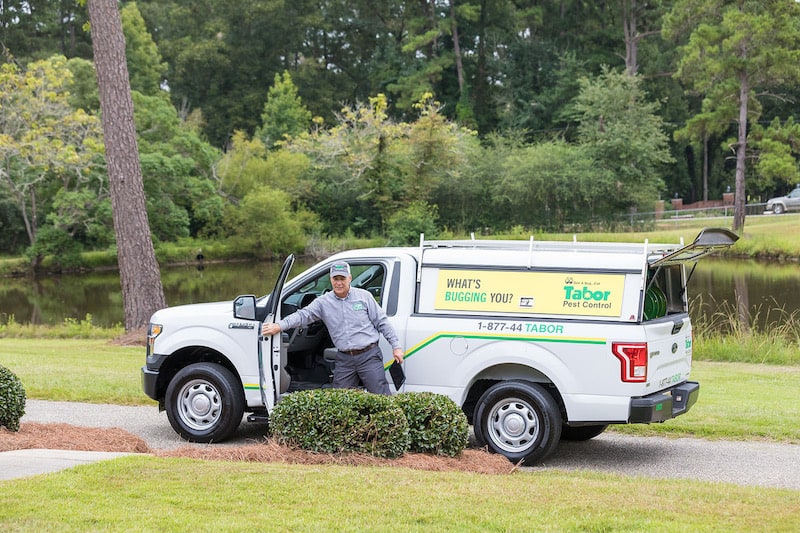
Once you recognize that you have pests on your property, it would be best to call for experts to deal with it to be on the safer side and have an inspection done.
The following are the benefits of hiring an expert for pest prevention:
- Prevention of property damage
- Reduction of health risks
- Savings in the long run by preventing property damage
- Expert knowledge of all kinds of species and correct identification of pests
- Use of safe and effective treatments
- Implementation of preventive measures
- Scheduled inspection and treatments once you decide to use their services
- Minimal disruption to your daily activities
- Availability of emergency services
When you see hints of pest infestation or the bug season is nearing is the best time to hire a professional to deal with bugs and save you time and energy.
Hiring an expert would be beneficial in finding out when are the peak bug season and which species of pests could cause infestation. They would apply preventive measures to control, manage, minimize, and eliminate several insects and pests from your space.
To hire an expert, call us now at 877-448-2267.
Mistake #4: Not addressing the root cause
Sometimes even when property owners get pest control services done, they would often and quickly face the problem with pests again. It’s not because the professional didn’t do their job correctly, but it’s because homeowners failed to address the root cause of the infestation in the first place.
How clean and properly organized you keep your property matters the most.
Of course, if bugs want to enter your home, they will go through any means, but when we pay attention to keeping things clean, we eradicate 90 percent of the chances of pest infestation.
When your home is cluttered, it’s in the most accessible condition to attract different species of pests and come live there. When one enters, other insects could be easily found inside as well, as they live in a food chain system feeding off each other.
Another root cause is when you don’t get home maintenance done consistently, and this has a greater chance of infestation not being discovered.
A regular inspection can help you discover things faster, preventing property damage.
Address the following issues:
- Keep your home organized and clutter-free. Pests could get attracted toward any piles of clothes or waste material.
- Keep your home clean, and make sure you clean your kitchen each day before sleeping. Do spring and autumn cleaning, which amounts to two times cleaning of the whole household, including all the nooks.
- Timely get your home maintenance. It can help find any existing pests.
Mistake #5 Using harmful chemicals
Most often, when people try to find which effective treatments would kill pests on their property, they search online. Without proper research, people could end up using pesticides which could be pretty harmful to you and your family.
Though pesticides kill or control pests, including bacteria, fungi, other organisms, insects, and rodents, they could be potentially harmful when not used properly.
According to a survey, 75% of U.S. households used at least one pesticide product indoors during the past year. When used indoors, this worsens indoor air quality.
Along with pesticides following are other possible sources that cause harm as well:
- Contaminated soil or dust coming from outside
- Stored pesticide containers
- Household surfaces that collect and then release the pesticide
In households with children under five years old, almost one-half stored at least one pesticide product within reach of children.
Exposure to such pesticides can irritate the eye, nose, and throat, possibly damaging the central nervous system and kidney and increasing the risk of cancer.
Symptoms that one might suffer include headaches, dizziness, muscular weakness, and nausea.
All of this majorly results from when you don’t know which pesticides to use and in what quantity. Most of the time, you don’t even need to use harsh chemicals to kill pests.
Things to remember when using pesticides:
Here are a few things you need to remember about using chemicals to avoid exposure:
- Use according to the directions mentioned on the product’s label.
- Mix and dilute outside.
- Apply in recommended quantities. If you don’t know about desirable quantity, don’t use it.
- Increase ventilation when using pesticides.
- Ensure family members and pets are not inside the home when using chemicals.
- Use non-chemical methods where possible.
- Don’t store pesticides inside the home. Keep them outside in your garage; if not needed, dispose of them carefully without harming the ecosystem.
- Keep your home clean and organized by regularly allowing ventilation.
Most importantly, call a professional to prevent chemicals’ harmful and unnecessary use.
FAQs
What precautions should I take to keep the pests away?
1. Keep your house clean and organized.
2. Avoid any unnecessary pile-up of waste materials of any kind outside the home.
3. Dispose of garbage in a closed bag and put it in a can with a secure lid. Dispose of your waste daily.
4. Avoid accumulation of any water indoors or outdoors.
5. Get any nooks or crannies with spaces in them filled up.
6. Fix any holes in your patio.
7. Keep your doors closed when not in use. Keeping doors and windows closed can get insects to come in easily without notice.
8. Add screens on windows to allow ventilation but not allow any insects to enter.
Protect Your Home & Health: The Advantages of Professional Pest Control
While the fall breeze is a welcoming change for people in southeast Alabama, it increases the pests population like stink bugs, acorn weevils, ladybugs, boxelder bugs, and house spiders, making things worse for property owners.
At the same time, summer is most annoyingly famous for mosquitos, while Spring brings ticks, fleas, wasps, ants, and termites with it in southwest Georgia.
Battling with such vast species of pests can be challenging on your own, for you must ensure they’re terminated while minimizing damage to your property. Tabor Pest Control has a professional staff with vast expertise and training on these pests to help you achieve just that.
What are the benefits of professional pest control services?
As a property owner, you try to keep things sanitized, ensuring no bugs enter your home or build a colony to destroy your property from within. But you can never be sure because they’ll get in there even through the tiniest cracks you’re unaware of.
For example, stink bugs are considered one of the most difficult pests to deal with, causing a big nuisance in Alabama as they like to cluster on the sunny side of homes for warmth.

As weather changes and fall turns up, these annoying bugs would try to get inside your climate-controlled property and cause havoc by flying around once they’ve settled their colony.
It is difficult to find the right time to apply preventive measures and look for signs of infestation before it can take place. Our team knows how these pests work and can keep you protected.
Cost-effective solutions
1. Prevention of property damage
Pests can enter your home and damage your property, leading to radical restructuring if not taken care of within time.

At Tabor, we know when and how to do an effective treatment to minimize considerable damage. We’ll ensure that your property faces minimum damage, so you don’t lose money.
2. Reduction of health risks
Pests can affect your or your family’s health in various ways, such as causing an allergic reaction, respiratory disease, and in general, affecting you mentally.
A hired professional from Tabor can quickly identify which pest is causing a nuisance in your space and find effective ways to eliminate it.
3. Savings in the long run
Sometimes a whole colony of pests is eating up your home’s foundation without you knowing anything about it. While a one-time pest control service can solve these extreme cases, you must also consider a long-term plan.
Sometimes pests don’t go quickly, and pests might reoccur under certain weather conditions or depending on where your property is located. For such cases having a continual maintenance plan is necessary.
This would save you a lot of money in the long run. It’s difficult to predict the costs as it’s based on the kind of service you’re getting, the size of your property, and the location of your property.
✅ We at Tabor Pest Control understand the value of hard-earned money and quality of work, which is why we are dedicated to providing excellent personal service. If a customer is unsatisfied at any time, Tabor guarantees that its technicians will not return until the problem is solved. If not, Tabor refunds the last service payment plus 10%.
Access to expert knowledge
1. Identification of pests
A mistake in identifying the kind of pest infesting your house can do more damage to your health and property. It would also lead to using the wrong treatment, which would also be a waste of money.
Tabor has cultivated its employees’ pest control expertise and has built its reputation on their service.

All staff has completed extensive training programs through instruction that includes classroom, online, and hands-on continuing education.
As a result, employees are up-to-date on the latest techniques and products.
An in-depth knowledge about the species of pests helps early detect the kind of weed, insect, animal, microbe, or any other organism. This correct identification can help to quickly handle the situation and use the proper control treatment to eliminate them.
2. Use of safe and effective treatments
When you identify the pest by yourself, you would just get the kind of treatment you think is right and spray it everywhere, which is a waste of money, resources, and the effectiveness of treatment.
With a professional, the benefit is that we have various ways to remedy the situation. While chemical treatment is one of them, we would try other treatments first.
Knowing the kind of pest we need to attack in different ways will be used to eliminate its presence. We wouldn’t use unsafe products which could harm your children and pets.
3. Implementation of preventive measures
Preventive measures include various things such as removing the pests’ food source, blocking their entry and exit, and using fewer pesticides or effective ways to utilize them when needed.
A professional not only uses chemicals to kill the pests troubling you but also uses other preventive measures to do the job.
Convenience and flexibility
1. Scheduled inspections and treatments
When you get services from a professional at Tabor Pest Control, you can benefit from the scheduled inspections followed by treatments if necessary.
At Tabor, our customized Home Protection Plan, offered as a monthly or quarterly service, provides that ongoing defense against many of the most common home-invading pests, such as roaches, wasps, rats, mice, ants, crickets, as well as other not-so-common pests
2. Minimal disruption to daily activities
In our day-to-day lives, we already have enough on our plate with responsibilities on both work and personal fronts.
Sometimes we get so busy that we forget to check or ensure our property isn’t infested with pests. But with a hired professional, you wouldn’t have to worry as they’re scheduled at specific times, causing minimal disruption to your daily activities.
When the inspections are scheduled, we won’t take a long time at each of these inspections and will be done with things quicker. It will bring you and your family peace of mind helping you not unnecessarily worry about what kinds of pests are lurking around your house.
3. Availability of emergency services
Pests contain different organisms infecting your property, causing you and your family trouble.
At Tabor Pest Control, we offer our customers free emergency service visits.
If you encounter pest problems between regular appointments, all you have to do is pick up the phone and call, and we will come right out at no extra cost.
You just need to sit back and not worry about what kind of pest is infecting your house and which treatment would be effective because we will take care of it all.
Pros and cons of DIY pest control

In haste to get rid of pests and to be cost-effective, you try to google a few things and then buy a treatment plan to spray on the pests.
While you think it’s helping you, you don’t realize that you’re doing more damage to your house with the slightest mistake of failing to recognize the correct pest species.
Do-it-yourself pest control has its pros and cons before you decide to commit to it. Let’s take a look at some of those down below:
| Pros of DIY pest control | Cons of DIY pest control |
|---|---|
| You can save money by buying all the treatment products and eliminating the infestation yourself. | You can quickly fail to recognize the pest and thus buy the wrong treatment products wasting your money. |
| You can buy the highest quality material leaving no room for doubt. | Sometimes you don’t even need chemical products to remove the infestation. Professional pest control services can provide other preventive measures to ensure your family’s safety. |
| You can spray where you think is the best place for infestation, avoiding areas where most of your family members stay. | You wouldn’t know the hidden places where the infestation is happening. Not wearing proper gear and poor handling can cause the infestation to spread to other parts of the house. |
FAQs
When’s the best time to get professional pest control started?
It’s best to hire a professional pest control in early Spring. That’s when you can destroy the colonies and prevent nests from forming. It will last longer as summer is prime time for insects to multiply and form colonies on your property.
How long does pest control usually take?
It depends majorly on the level of infestation your property is facing and the size of your property. The location is another important factor as some places easily get infested more often than others.
The kind of treatment would be using pesticides depending on the pest, preventive measures, or a combination of both.
Preventive measures usually take about 30 minutes, but extermination may need a full day.
What is the best benefit of pest control services?
The best benefit undoubtedly has to be cost-effectiveness and minimizing damage to your property. By hiring professionals from Tabor Pest Control, you can trust us to know about different pests and how to best terminate them without causing damage to your property.
In the long run, our services would save you a lot of money as compared to trying to DIY pest control. If not controlled or prevented within time, pests can cause considerable property damage.
What should I expect from Tabor’s professional pest control services?
We at Tabor Pest Control focus on the following:
- We Inspect: We will inspect your home from top to bottom, inside and out, for current or potential pest problems.
- We Design: We will conduct a thorough inspection and design our service to eliminate the pests invading your home in various seasons.
- We Service: We will service your home with various products.
- We Monitor: We will place monitors and traps strategically to catch pests.
- We Report: We will report our findings at each service.
- We Reservice: At your request, we will reservice your home to control the pest that is being a pest to you.
